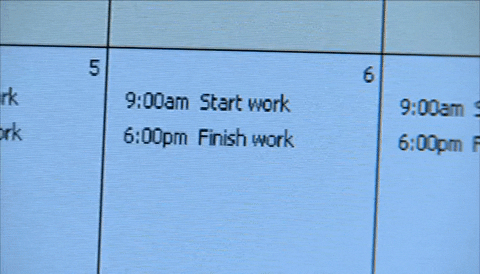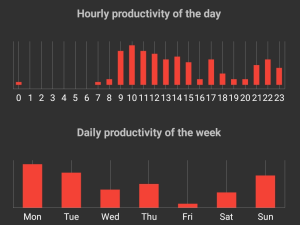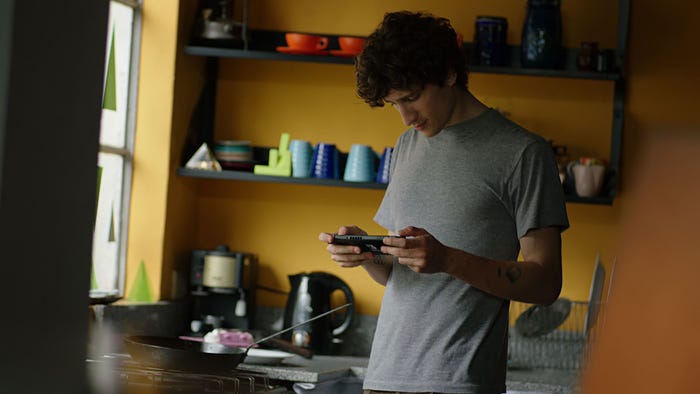
Featured Blog | This community-written post highlights the best of what the game industry has to offer. Read more like it on the Game Developer Blogs.
Number of developers working from home increased since the pandemic. Working alone when starting your game developer career is also frequent. If that's your case, I share a few tips to stay motivated and to improve your productivity.

I founded my video games company Frozax Games in 2019. In terms of work habits, it was a really big change from my previous job as cybersecurity engineer:
No more fixed 9am-6pm, Monday-Friday work time
No more open-space full of coworkers
No more commutes, but work from home
No more project managers telling me what to work on
No one checking on my work
No need to ask my boss to take a day off
No team, just me as solo developer

Some of these changes can be scary for some, and a dream for others. However, we can all agree that getting motivated and productive when you are alone and working from home can be tough. This post lists some tips and techniques I've used to help with these issues. I know some of them are controversial, but I just list what worked for me.
Schedule

Before going full time indie, I spent time on game development as a hobby, during some evenings/nights/weekends. The small amount of money I could get from this hobby was just a bonus, and not required to live, pay my house or raise my kids. My day job was sufficient for that, so there was no pressure in game development hobby. Therefore, I could also few weeks working on my games nearly everyday, and other times, I would not write a single line of code for months.
When going full-time, it was weird to work on my "previously-hobby" during classic work hours. At first, if I wasn't actively working any moment between 9am and 6pm, I felt bad. I thought I had to keep this "normal schedule".
Even though it was non consistent day after day, I estimate my productivity to be at about 50%, without really understanding why.
I then realized that I should embrace the fact that I work alone and nobody is here to enforce my schedule. Companies have constraints that I don't have. I don't need to work at the same time as coworkers. My office being my house, it's not open only during day time. I finally applied this first advice:
Work when you are motivated, not when the clock says so.
This means I sometimes work weekdays 9am to 6pm (quite rarely, actually). But I can also work Sundays, or the evenings if I think this is the right time.
Being able to work anytime allowed me to not feel guilty if it's Tuesday, 3 pm and I don't feel like working. Now I accept it, and I'll do it when I'll get motivated, probably later during the day, the next day, or even later.
I can also use any time during the day to do personal things, such as: driving kids to school, shopping outside peak hours, doing a nap to recharge my batteries for the rest of the day and much more...
I can also just wake up and decide: "I'm not feeling motivated to work today, I take my day off". This can't work for all jobs, and I also do sometimes have meetings or calls that I can't postpone but you get the general idea.
Of course, we need to be careful with two things:
Procrastination: Never being motivated and actually not doing anything (more tips later on motivation)
Burnout: Working long hours every day, without resting enough, leading to potential burnout after some time.
A good balance between work and rest is important.
Getting Motivated
I'm lucky to have a job I chose, so I love (most of) it. But we've all been through more difficult times, where nothing motivates you and it's not just because you are tired. Here are my thoughts about this.
I found out that the main reasons I'm not motivated are caused by the work itself, for example:
I just completed a task, or released a new game, and I don't really know what to work on next.
I should work on boring tasks (such as paperwork, support, marketing...), but I don't feel like it today
I'm a bit bored with my current project
The most common issue is the lack of objectives or unclear objectives. The fix is obvious:
When you seem a bit lost in your current project, spend some time on your todo-list and split the tasks in smaller tasks.
You might also need to add more details to existing tasks. It will help you have clearer objectives and you'll usually be able to jump right into it. The hardest part is identifying the problem.
The other issue is simply that you've spent too much time on boring things, and you want something new and refreshing.:
It's fine to temporarily change your roadmap to work on more rewarding things
I doesn't mean you'll give up or cancel your current project and tasks. Just spend some time on something else: start a new project, learn something new... Here are examples of how I've done this recently:
New project: At the end of 2020, my current project (I mostly work on puzzle games) was going very slow and felt a decrease of motivation. At the same time, I just got an idea for a simple hyper-casual game that felt interesting.
I stopped everything I was doing, and spent 3 days working on this new idea for 10-12 hours per day, doing everything myself (code, art, design). The day after, I released an initial version of this game on the Play Store. Just the excitement of releasing a new game gave me a boost of motivation. This boost was global and I could go back to my previous main projects more easily. I basically left my initial roadmap to insert this new project. I was productive and motivated. This game was not a hit but considering it was done in a few days, it's not that bad.
Trailer of "3 Seconds", a fun game made in a few days to boost motivation
Learning new things: Learning gives you motivation and can also bring inspiration and creative ideas. Last winter, I spend some time learning Pico-8, a retro fantasy console, and creating a few animations. I initially didn't consider the time spend on this to be actual work because there was nothing made commercially. But it was a good way to spend 2 weeks off, while still learning some game related stuff. I released a 8-bit port of two of my games, as well as a few animations on twitter.
I also made a small prototype of a VR game in Unity.
I learnt pico-8 and create free retro versions of my most popular mobile games.
Join a game jam: This tip is specific to game developers, but it is just another example of working on a fresh small project more or less related to your business. I participated in two game jams (also using Pico-8 I just learnt) and it was very interesting.
Even though these projects were made just for fun, one of them has been promoted to an official commercial game. Indeed, DNA Mutations got positive feedback and ended 2nd in the game jam, so I decided to release to mobile version of the game.
DNA Mutations: a game released initially as a side project for a game jam
Another tip to get motivation, especially if you are working alone is this one:
Talk about your project, show your work, look for feedback
It can be showing a demo version to some friends or posting a gameplay video on social networks for example. I noticed that even if it doesn't create any interaction, it creates sort of an engagement with others, and forces you (in a positive, motivational way) to improve and keep working on this specific project. When trying to work on new ideas, I posted a few work-in-progress videos and like the feedback. The ideas never came to life, but gave me a lot of energy.
Here is a small video of a #physics game #prototype I've been working on recently (yes, it's a new one...). #indiedev #gamedev #liquidfun #box2d
— Francois Guibert #gamedev (@Frozax) October 31, 2020
I don't know how far I'll go with this one but #screenshotsaturday is the opportunity to share! ;) pic.twitter.com/RIgWqmvwee
A tweet I made to get feedback on a current prototype
On a similar social topic, you might also miss physical interactions. Being an introvert, I'm not the person that needs the most physical interactions. However, I still try to work outside from time to time. I usually join a few other friends in a coworking space, in a pub or even at each other's place.
Join other local workers if you miss physical social interactions.
Actually, we work next to each other, but not really together, as none of us is working in the same field. It's still interesting to chat especially with the isolation creating by the pandemic. To be honest, we sometimes just spend the work session chatting about each other's personal life. It's still very beneficial to stay motivated.
Being Productive
Pomodoro
I especially want to focus on the Pomodoro technique, that really changed my way of working.

By The original uploader was Erato at Italian Wikinews. - Transferred from it.wikinews to Commons by Fale using CommonsHelper
During the pandemic, lots of people worked from home for the first time. Many struggled and I've seen lots of advices on twitter about it. One of the best advice I discovered was to use the pomodoro technique. I still use it today and find it great.
Use a production tool such as Pomodoro
You can read the full documentation on Wikipedia but basically it works like this:
- You pick a task, and spend 25 minutes working on it, without interruption (no internet browsing, no phone).
- After 25 minutes, you take a short break (5 minutes usually)
- You start again with a new task (or the same if it's a long one) during 25 minutes
- After 4 sessions of 25 minutes, you take a longer break (usually 15 minutes)
- And you keep going with a new round of 4 sessions.
Clearly, the single most important thing for me in the Pomodoro is this:
Disable every distractions to stay focused on your task
You should use the breaks to check personal emails and eventually reply to your text messages.
My Changes
As for many rigid techniques, I think it should be adapted to everyone and every job. Here are the changes I made in my daily routine:
I allow myself to skip the breaks. When I am very focused and efficient on a specific task (coding, debugging, or anything else), I just skip the break and immediately starts a new 25 minutes session. I also allow myself to skip large breaks. I estimate that I skip short break 60% of the time, and large breaks 30% of the time.
My small breaks last 4 minutes instead of 5. It's just 1 minute, but I actually noticed the difference, 5 minutes was too long for me.
Feel free to adapt the tools to your job and your personality.
Common issue: completing a task before the end of a session
I keep global tasks in Trello boards and pick them there. Sometimes, my current task is completed before the end of a session and I didn't actually think about the next one carefully. You should really try to avoid that but when it happens, I usually have other more global tasks that are always available. For exemple, writing this blog post is one of them. I consider this to be work, but it's not urgent, and I can just spend a few minutes proofreading or improving the article. Some other tasks such as studying the competition, replying to an email from a player can be used to complete a session.
The breaks
During the breaks, if possible, you should try to get up your chair. I find it important to have a physical activity. I usually walk around the house, doing chores (laundry, tidying, thinking about my next meal, updating my groceries list...).
How many sessions should you work everyday?
Of course, everyone will have it's own preference. It depends on your current tasks, some of them can be very exhausting. It also depends if you work 4, 5, 6 or even 7 days in a week. I consider that 10 sessions in a day is already a good day (I usually work 6 days per week). I don't mind if on some days, I only do 2 sessions, and some other days 16 or 20... However, I generally work between 8 and 15 Pomodoros per day. It might seems like not much. However, I'm so focused during these sessions that it's very efficient and tiring work. I realized that when working 9am-6pm in an office on a "classic" job, you don't actually work that efficiently (you get interrupted a lot, there are useless meetings, some chatting in the open space or at the coffee breaks...).
Experiment to find your most productive hours
I found out that my most productive hours are usually 9am-1pm. And my least productive hours are usually 2pm-4pm. That's when I usually do my lunch break, do shopping, or sometimes have a small power nap.

My work statistics from the last 28 days (taken from the app Pomodoro Smart Timer)
Benefits
Now that I've been using Pomodoro for more than a year, it's been automatic for my mind to understand that when a session is in progress, I stay focused, disable distractions (social networks, phone, emails) and get things done.
Here is another tip that I discovered since using Pomodoro:
When not feeling motivated on a specific day but still want to get something done, just try to start ONE Pomodoro session.
You can probably easily find a task to work on for 25 minutes. And while it's quite difficult to start it, I generally end up doing at least 3, 4 or even more sessions.
It also helps me keep track of time spent working. I know I sometimes work outside Pomodoros so I don't track everything (you should try to avoid that). It is especially true for the time thinking (under the shower or while driving somewhere for exemple). But also when replying to app store reviews that I often reply as soon as I see them.
Tips that I don't follow
I've read many other tips from people working from home. Here are a few of them that I didn't feel the need to follow.
Many people suggested to get ready as if you were going out to work: have a breakfast/coffee, take a shower, get dressed properly. I personally don't need to do that, and often jump on my computer as soon as i get up. Usually, I take small breakfast or just drink something during the first small break, and take my shower during the first large break.
Another advice I don't follow is using a different room for home and work. It's mostly because I don't have any spare room for that, but I don't have issue separating my work and leisure time, even if both are on the same desk/chair/computer. My way of separating work and home is seeing the Pomodoro timer going on or not, actually.
Don't follow other's tips blindly: experiment and adapt
Conclusion
I hope this article gave you ideas and you will actually try any of my tips. Please tell me in the comments or on twitter if you already follow some of this tips or if you have new ones that could help anyone working alone and/or from home.
Feel free to share this article!
Read more about:
Featured BlogsAbout the Author(s)
You May Also Like









